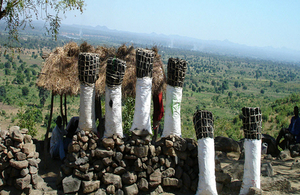World agrees historic global climate deal
The UK welcomes the deal to cut carbon emissions and protect the poorest and most vulnerable countries from the effects of climate change

Charcoal has been a leading cause of deforestation in Malawi
A historic new global climate agreement has been struck at the United Nations conference on climate change in Paris.
The deal takes a significant step forward to reducing emissions. For the first time ever 195 countries, including the world’s largest emitters, have now committed to act together to combat climate change and be held equally accountable.
It marks a clear turning point towards a sustainable and low carbon future. Countries will now have to come together regularly to review their climate plans and collectively ensure that the necessary action is being taken to tackle climate change.
Prime Minister David Cameron said:
“In striking this deal, the nations of the world have shown what unity, ambition and perseverance can do.
“Britain is already leading the way in work to cut emissions and help less developed countries cut theirs - and this global deal now means that the whole world has signed to play its part in halting climate change. It’s a moment to remember and a huge step forward in helping to secure the future of our planet.”
Also commenting on the deal, Energy and Climate Change Secretary Amber Rudd said:
“We have witnessed an important step forward, with an unprecedented number of countries agreeing to a deal to limit global temperature rises and avoid the worst impacts of climate change. This is vital for our long-term economic and global security. This deal will ensure all countries are held to account for their climate commitments and gives a clear signal to business to invest in the low carbon transition.”
On what this deal means to Malawi, Charge d’Affaires for British High Commission in Malawi, Martin Scales said:
“The Paris Climate deal means that the big emitters now have to act. Malawi stands to benefit from the COP21 outcome through new support to develop low-carbon economic growth and to protect its forests.”
The deal sets out a clear long-term goal of net zero emissions by the end of the century, showing that the world is committed to decarbonising. Progress against this goal will be independently assessed in 2018 and every five years thereafter.
This long-term goal sends a strong signal to investors, businesses, and policy-makers about the shift to a low carbon economy and provides confidence that will help drive the scale of investment needed. As a global leader in low carbon goods and services the UK is in a unique position to benefit from this.
As the costs of low carbon technologies come down, countries will be able to step up their targets on reducing emissions. To reflect this, in 2020, countries will be expected to update their plans to cut emissions by 2030. Countries will also be legally obliged to make new post-2030 commitments to reduce emissions every 5 years, from 2025. For the first time, all countries will be held accountable by independent review for acting according to their pledges.
As previously agreed, all developed countries will collectively mobilise $100 billion per year from both the public and private sector, to help the poorest and most vulnerable countries to protect themselves from the effects of climate change and support low carbon development. This agreement now recognises the role of emerging economies in mobilising resources and contributing finance over time as well.
This agreement drives us forward on our path to limiting global temperature rises to below 2 degrees, or even 1.5 degrees if action happens quickly enough. But governments cannot act alone, all parts of society, including businesses and investors have a role to play. Paris has already resulted in transformational action that will have a real impact on the ground in countries, cities and communities around the world.